Austin’s NPR stations tackle the changing music scene in a groundbreaking collaborative podcast.
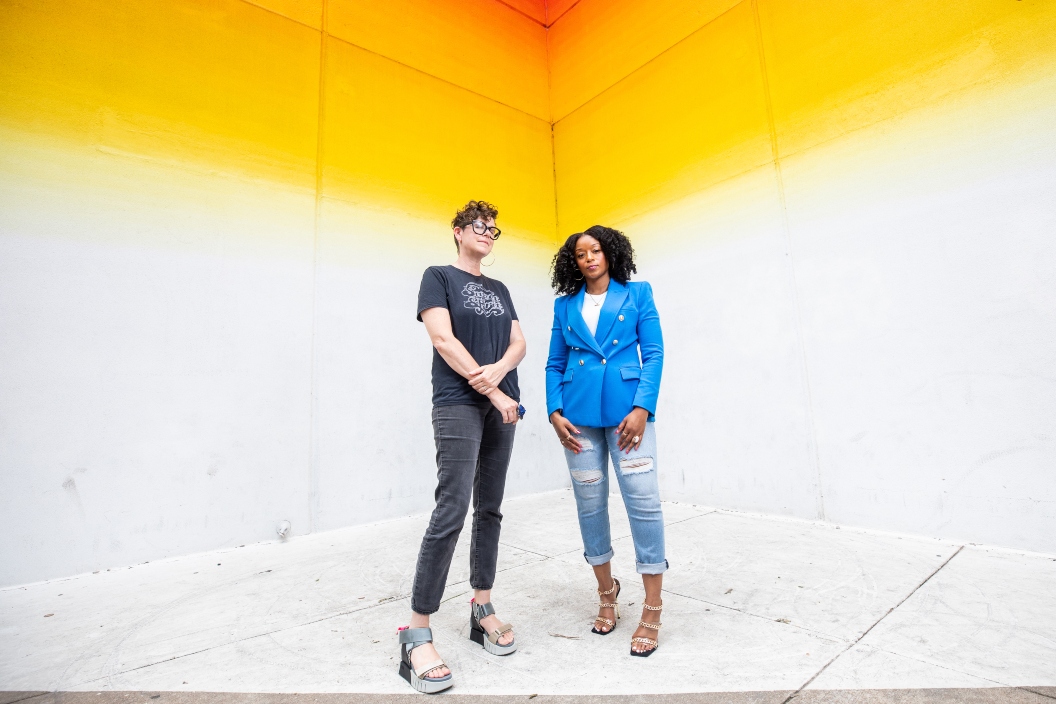
By Brianna Caleri, Photos courtesy of Pause/Play
I was in the Austin Woman office, so sure but still uneasy. They’re not going to cancel South by Southwest. It was a week away, and there were no COVID-19 cases in Austin yet. It was the only thing I was looking forward to. Surely we can hold on a little longer. Surely we can limit the events to Austin residents. There were rumors, and I’d been verbally threatening a meltdown all day.
Immediately upon reading the announcement, I slumped into a chair in the assistant editor’s office. An intern had the misfortune of meeting me that day. So not only do I remember where I was, but Courtney Runn remembers where I was. And that poor intern might too.
Pause/Play, the first podcast collaboration between Austin’s NPR station KUT and its sister station KUTX, revisits that moment. The local stations usually stick to news and full-time music, respectively. But co-hosts Miles Bloxson and Elizabeth McQueen are bridging the two with news about the changing shape of Austin music. Voices start setting up stories, either of busyness or of eerie mundanity right on the edge of being shattered. There’s no explicit context at first, but the trajectory is uncannily obvious. “What you just heard were the voices of some of the people who make up Austin’s music scene,” narrates McQueen. “They all remember where they were when South by Southwest was canceled.”
Reality Sets In
Everyone else can say it’s over. But I’m going to retain a little bit of control over
Jeannette Gregor, venue manager of Mohawk
how long we get to go out on the playground.
I lost a few stories and a few handfuls of good reasons to get out of the house. But artists tuning in to the press event from around the city lost their best income all year, their opportunity for the ultimate exposure Austin can offer and, for many, a sense of purpose before a gaping abyss of disconnection as an entertainer and a social being. The omnipresent Austin electronic artist Mobley explained to Pause/Play that 50 to 70% of the band’s income for the year is expected from the two weeks of SXSW.
Every city that recognized the reality of the pandemic had some version of a rude awakening, followed by an eerie slumber. Austin, with its easy access to the outdoors and high prevalence of remote workers even before the pandemic sent them home, had a relatively soft landing entering lockdown. It was the canceled festival, one nearly without rival across the United States, that served as an initial shock with immediate, tangible repercussions. It’s difficult to explain to outsiders, especially those who experienced earlier cases and more threatening numbers, why it was so devastating. It wasn’t the dreadful uncertainty of a looming health crisis; it was a sudden widespread collapse in all its gruesome tangibility. Living in Austin, it’s hard not to measure everything that came next against that moment. We’re doing so much better. How do we know when it’s time to move on?
“Is the Pandemic Over?”
Texas lawmakers have been pushing forward, but not everyone is in agreement. This March, Governor Greg Abbott lifted the statewide mask mandate, with three of his four chief medical advisors telling the Texas Tribune they had not been consulted. Austin, backed by Mayor Steve Adler, kept the public mask mandate intact and was swiftly sued by Texas Attorney General Ken Paxton. In May, when the CDC announced that vaccinated individuals no longer needed to wear masks or social distance, Austin was simultaneously ahead of the curve and, for some, reluctant to be there. In response to the CDC’s announcement, the Pause/Play hosts asked the loaded question, “Is the pandemic over for the Austin music scene?” The answer was unanimously negative.
“I think they were scared,” guesses Bloxson. “People are scared to say, ‘Guess what? It’s over.’”
Austin’s deputy medical director and homeland security’s public information officer discussed statistics suggesting that no, the pandemic is not over. Mohawk venue manager Jeannette Gregor discussed reopening precautions. “Everyone else can say it’s over,” says Gregor. “But I’m going to retain a little bit of control over how long we get to go out on the playground.”
Austin rapper The Teeta said it doesn’t matter if it’s over; Austin is opening up anyway. “I gotta stick with the times,” he says. “If everything is back open, I should be there. I should be visible.”
While Austin needed people like Gregor to ease the transition, Teeta’s prediction quickly embodied what the scene seemed to take to heart after taping.
The Birth of Pause/Play
It may be hard at this stage to keep tuning in for pandemic talk. But on Pause/Play, it’s often too relevant to feel burdensome. Artists know why they’re there, and their personal takes can be surprisingly nuanced. In that episode especially, they laced their feelings with the apparent awareness that these interviews were meant to answer a practical question. It was calming, informative and most importantly, not preachy or anxious.
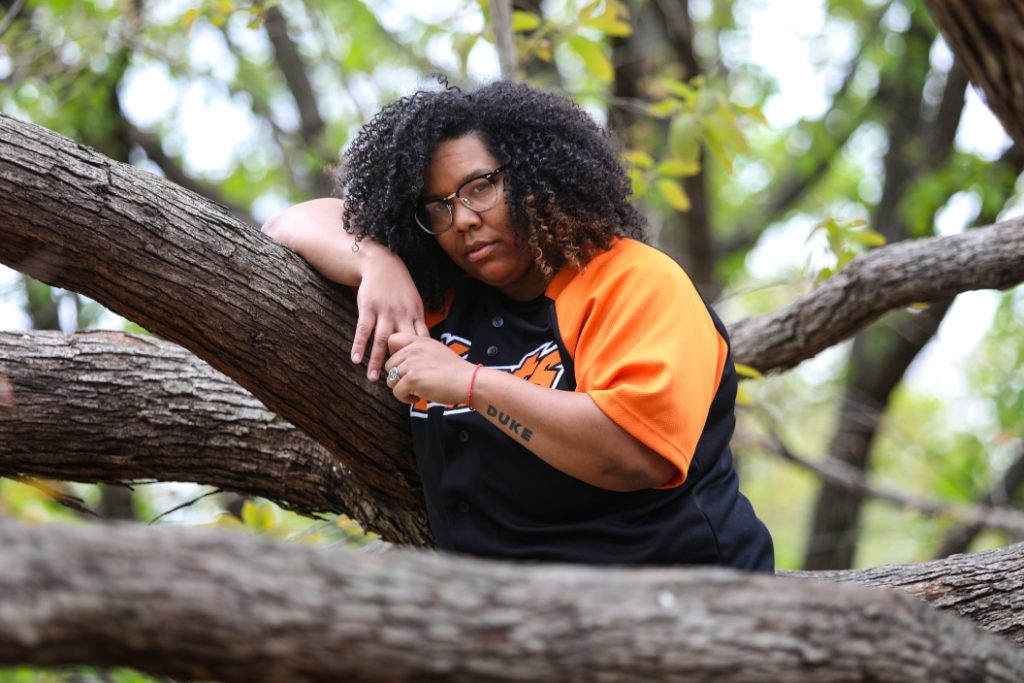
Mama Duke 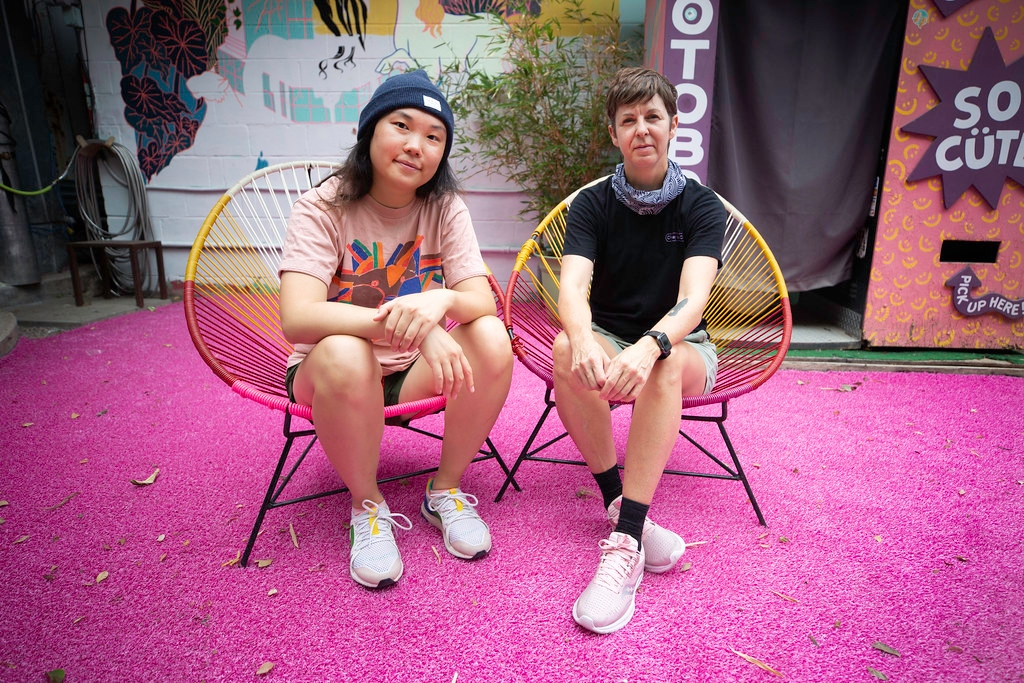
Cheer Up Charlie’s 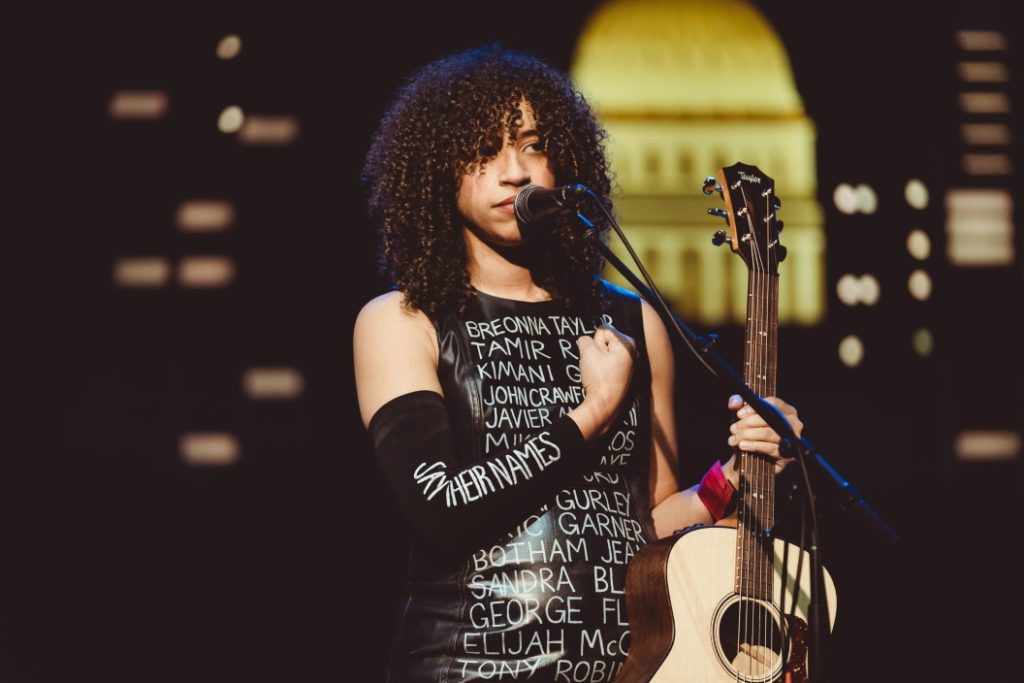
Jackie Venson
The idea for Pause/Play was conceived when McQueen’s prior podcast at KUTX, This Song, was coming to an end. The station wanted something new in its programming. Current events in June 2020 left a few obvious options. The show’s executive producer, KUTX Program Director Matt Reilly, suggested exploring the consequences of the pandemic in the music industry. McQueen ran with the idea and quickly realized it was too much to handle alone. (On top of Pause/Play, she was still on air once a week and producing a hip-hop podcast called The Breaks.) Initially, it was overwhelming and confusing to narrow down multiple individual stories into one clear narrative. Now the podcast has systems in place for interviewing as many as 15 people for just one episode.
Bloxson, a full-time on-air personality at KUT, was in the studio early Saturday mornings, where she could see McQueen through a separating window. Her hands were in multiple projects, producing and editing as her help was needed. She would chat McQueen up about her family during breaks, curious about how different their lives were. (Bloxson was navigating the dating scene; McQueen was making time for her husband and kids.) They found they both loved “crystals and the universe and energy and stuff” and just enjoyed each other’s presence.
Kindred Spirits
McQueen called Bloxson and invited her onto the project as a permanent fixture. The two now form a seamless team. Bloxson, a lifelong Austinite who never misses a chance to remind anyone of her provenance; McQueen, a professional musician who performed as both a solo artist and as part of the renowned country band Asleep at the Wheel. Together they embody the two things Pause/Play is really about. Bloxson proved to be especially helpful at narrowing down the scope of each topic and reining in McQueen’s tendency to overwork. Conversely, McQueen inspires her partner with her work ethic and sometimes acts as the push Bloxson needs to focus more deeply. The two meet in the middle and are both strongly committed to weekly check-ins. They’re proud that when outsiders ask them questions, they already have agreed-upon answers.
The Pause/Play hosts mention the name Matt Largey often when reflecting on the support they receive from their public radio coworkers. Largey, the projects editor at KUT, was in the brainstorming meetings. He was intrigued by the opportunity to combine the harder news of KUT with the musical focus of KUTX. When McQueen and Bloxson joined forces, he became a sort of mentor who helped them get used to working in more journalistic roles than they’d ever been in.
“They’ve really sort of adopted this kind of journalistic mindset about this whole thing,” says Largey. “They’re really driving the bus here. A lot of people their first time out don’t necessarily get a lot of that stuff. So I’ve just been really, really impressed with what they’ve done.”
A Voice for Artists
Largey is the final audio editor for the podcast and helps the duo sort out issues within the process. Especially regarding ethics. He points out that the podcast uncovers not just the movements of artists affected by the pandemic, but its implications for the identity of the entire city. It’s a morally significant task to chronicle this type of change.
McQueen and Bloxson don’t want to give their entire script to pandemic talk. They didn’t at the beginning, when it was on everyone’s minds, and they don’t now, with an end in sight. Unavoidably, pandemic news does shape every aspect of what’s available to the Austin music scene right now. But there’s plenty of industry talk to get into.
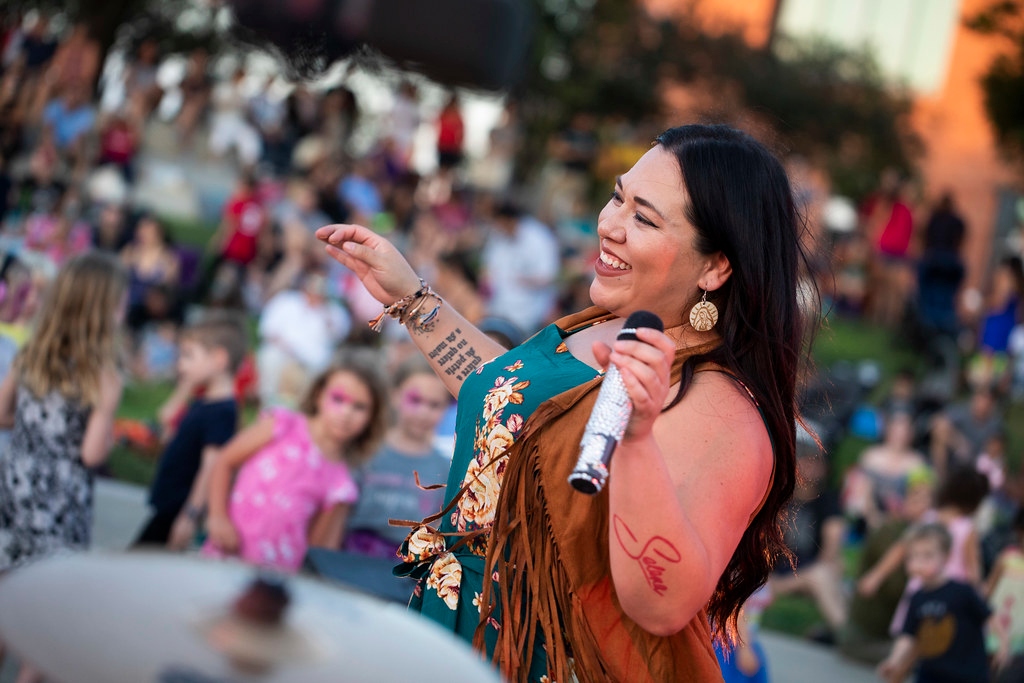
The episode “One Year Later” delves into, among other things, the rapid period of racial reckoning Austin went through with the rest of the country last June. Stephanie Bergara of the Selena cover band Bidi Bidi Banda discussed the diversity clause the band added to its live performance contract. If the band senses they are being used as a token, or in any way that doesn’t align with their views on diversity, they have a right to cancel the show without collecting payment. Episode “The Pivot” recorded the story of Free Lunch. A nonprofit started by musicians that pays workers to deliver meals to the unhoused and raises money through its print publication of the same name.
Understanding Austin Music in a Deeper Way
The format usually jumps between little vignettes that are connected in topic or time frame. Some episodes, such as “Jackie Venson and Austin City Limits” or “Music and Activism with Jonathan ‘Chaka’ Mahone,” offer a deeper look into one person’s experience.
There hasn’t been one type of episode that defines Pause/Play. (Although “Is the Pandemic Over for Austin Music?” is perhaps its strongest journalistic accomplishment.) The podcast adapts to Austin’s climate and interests. Overall, it’s become a mutable balance of industry talk and personal experience. Bloxson, the more outwardly curious of the two hosts, is a subtle audience surrogate as a music lover who asks questions more than provides answers. McQueen started with firsthand awareness of the music industry but is still learning unexpected angles from interviews. She recalls talking to the Mohawk’s Graham Reynolds about his responsibilities as a concert promoter and feeling surprised by his answers.
“The podcast is about the pandemic,” McQueen says. “But it’s really about the Austin music scene and getting people to really understand it in a deeper way. One of the things that we came up on again and again is before the pandemic, people kind of just took it for granted that it would just be here. The pandemic really showed how fragile it was and that it’s not a given that Austin is always going to have this live music ecosystem.”
What’s in a Name?
Bloxson bravely expressed a point of confusion in “The Pause” that had been nagging me, an outsider, for years. “I’ve lived here all my life. I really never knew why we’re called the live music capital of the world, anyway.”
McQueen explains that in 1991, Austin had the most venues per capita of any city in the world. The Austin City Council put the slogan to a formal vote. “We actually have audio of the moment that it all happened at the Austin City Council,” McQueen says before introducing a clip of said audio. The ensuing podcast conversation basically concluded that this status is feeble. To live up to its statistical promise, Austin has to actively value and strengthen its music scene.
“There’s this very specific kind of musician and creative who chooses Austin as a home base,” says McQueen later in the episode. “I mean, we have a lot of places to play live music, and we do have a lot of festivals. But beyond that, we don’t have much of a music industry infrastructure.”
“You mean, like, we’re not home to a bunch of major record labels or publishing companies, right?” clarifies Bloxson.
“Right. From my perspective, the kind of musician who works here tends not to be as concerned with music industry stuff or becoming famous.”
Of course, McQueen is not insinuating Austin musicians lack aspiration, rather that they came to this city searching for authenticity. Artists in Austin make do without much on the industry side, so a lot rests on the grassroots music community. In turn, it rests on the public, who fund art, inspire it and need windows into the scene, like Pause/Play, to understand how to best engage in it.
Real Connections
A pandemic story, coaxed out by a concerned interviewer, can get pretty sad. Bloxson notes that sometimes subjects feel timid talking about their wins during a tough time. The show is anchored to moving forward in reality on several levels. Weekly meetings with the radio teams, listener feedback, artists writing in to offer their stories and most importantly, incredible honesty in interviews.
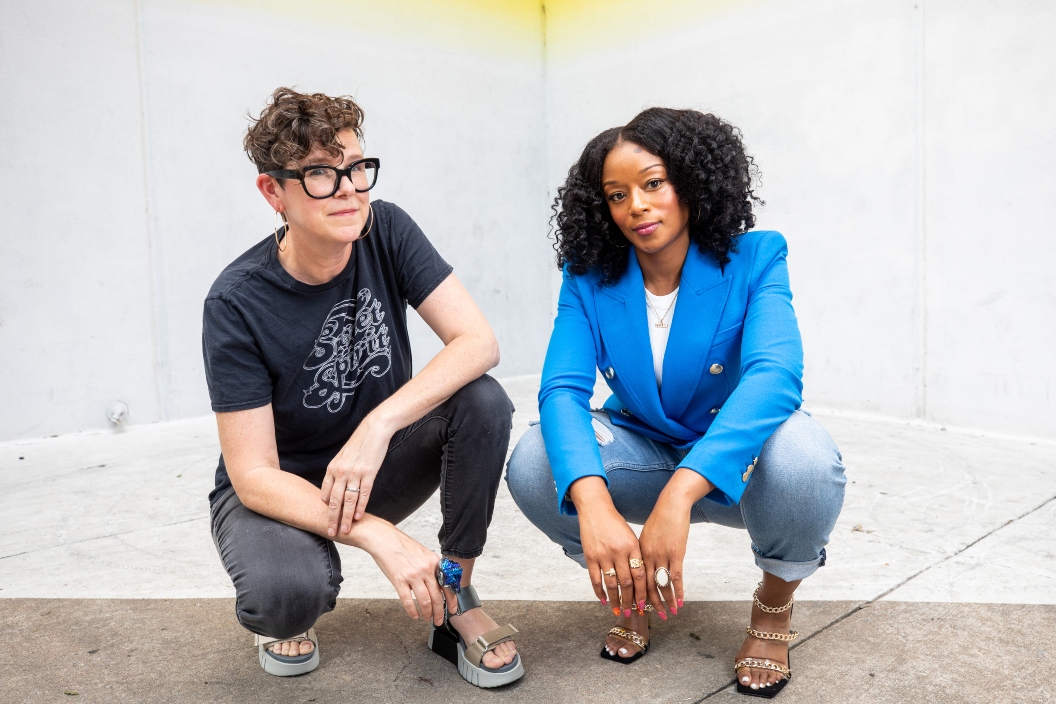
Bloxson reflects, “Growing up in Austin and knowing that I’m in the live music capital of the world, I never really was connected to the scene. I would go to shows here and there. Now I can walk into Hotel Vegas and know the bartender because we interviewed her. Or I’ll walk into Mohawk and know the owner; Cheer Up Charlie’s is commenting on my Instagram. I feel more connected and didn’t even realize I was making those connections.”
Now that venues are opening, there are few better ways for a musician to end their night than a concertgoer approaching. Stopping them to say, “I’m a new fan. I heard you on Pause/Play, and I’m so happy an artist in Austin really gets me.”


